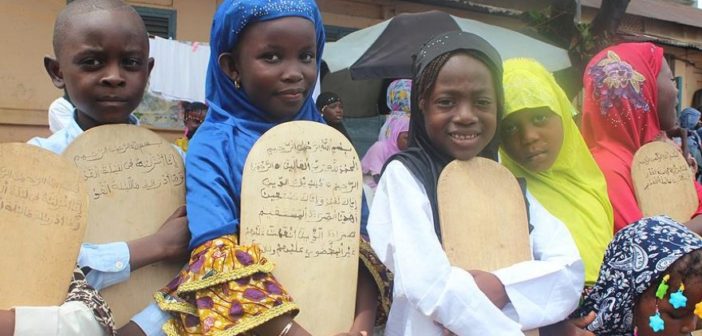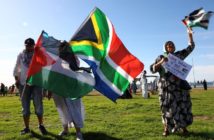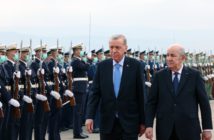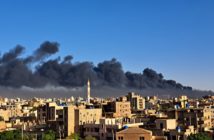The spread of Islam to Asia and Africa by conquests in the first century of the hegira was just a beginning. The fact that the new religion has been placed over the centuries to function in the genes of hundreds of societies of different nations was made possible by a solid religious education for believers. The two continents, who in many ways separated from each other, had to memorize some of the Surahs of the Qur’an from Arabic origin except for their native language so that they would worship. . Especially in societies other than the Arabs, the only center for learning is the places around what we call the Qur’an Course and around the place of worships which surrounding the three continents in order to give this education to Muslim children in the most beautiful way. Until the end of the nineteenth century, this education network, which was generally preserved, was wanted to be undermined by colonialism.
Muslim societies which had given their children a great willingness to read and memorize the Qur’an as the first step in Islamic education for centuries, met with colonialism in a hostile manner against these educational institutions for the first time. Because the European states, who see the importance of receiving Qur’an education in the neighborhoods where Muslims live, were not slow to understand that such generations of educated generations for their future colonial regimes would not accept them and they would have a great deal of obstacle in places where they wanted to invade. Two reasons were particularly important in this respect: Firstly, the teachers who read the children in these educational centers, they were in a position to fight against the colonial administrations. Secondly, the new generations would not be influenced by a foreign culture because they were raised in their own national and spiritual cultures.
The early 20th century, almost all Muslim countries except Turkey, Afghanistan and Iran were colonized. In this sensitive situation, the Qur’an education was followed closely in Islamic all lands that were colonized. In almost every field, various specialists were trained to get to know this world better. An important part of them had made the subject of review which especially conducted in simplest terms and described as the Qur’an course of educational institutions. A limited number of experts conducted research on various madrasahs including Ezher in Egypt, Zeytune in Tunisia, some others in Istanbul, Central Asia, India and Indonesia and similar institutions like these, in other parts of the Islamic world. Those who were exposed to the most pressure among Islamic education institutions were undoubtedly the Qur’anic Schools in the French colonies in Africa. Today tens of thousands of Qur’anic schools and schools providing regular education continue their activities side by side in the African and Asian countries. Even in European countries, Muslims have opened a large number of Qur’anic Schools due to immigration in the 20th centuries. Today it is stated that there are six hundred (600) Qur’anic Schools in France and thirty-five thousand (35.000) Muslim youths are continuing these.
African Muslims give these educational institutions different names: Such as “Küttâb” Tunisia and Egypt; “Mesîd” in Morocco; “Massik” in Chad; “Makaranta Allo” in Nigeria; “Daara” in Senegal, “Madhara” in Maurutinia, “Zaviye” in Libya and “Dox” in Somalia. Those who teach in the Qur’an is called “alfa” or “alfaga” in Songay language which spoken in Mali and its around; “karamoko” in Bambara language, “mobid”, “chierno”, “fojo” (according to their levels) in Fulani language; “mu’alem” in Hevsa language which spoken commonly in Nigeria, “foundi” in Comors and “mwalimu” in some countries such as Kenya and Tanzania. However, the Muslims of the region use the word of “marabu” which is the local spoken form of Arabic word “murabıt”, rather than the local naming.
In the West African countries, in the news reports about children who took the Qur’an education, it is seen that they carry pieces of wood in their hands. Because children who are subject to this education in Africa write their homework on the board with their hands on the front and the back face of charcoal, gum Arabic, or the charcoal accumulated in the lower part of the pots with a black ink obtained in various ways. In recent years, however, there is an increasing tendency for students to use pencil and paper. They write about the lessons learned by the board, write the new ones to delete the previous article and the slightest waste does not occur. Students who come to the level that will write a verse from the Holy Quran, it proves that he learned by repeating his teacher.
In Quran schools in African countries, this blackboard is called “alluha” which is the local pronounciation of the word “el-levha” in Arabic. Students do not separate these plates from their sides. The French preferred the term “tablette coranique/Quran tablet” or “planchette coranique/Quran plate” for this course board.. This plate which is approximately/about 40 cm long, 20 cm wide and 10 mm thick, has a hand grip on the upper part. Students provide a pencil made from rose or bamboo wood to write on this plate.
With the colonialism, in general the French called these education/training nests “Ecole coranique” which means “Quran School”; the British called them “Coranic School” or “Koranic School”, the Portuguese called “Escuela Coranica” and the Italians called “Scuola Coranica”. Westerners insisted on simply referring to all embodiments within this educational network as the “Quran School”, no matter how advanced the level of education. In fact, they did not recognize even the madrasas in which the great scholars grew up in many parts of Africa, as rooted educational institutions, and they saw these places as the places where the Qur’an was read only or recited. However, in the traditional education that has been going on for centuries, the famous hadith books, fiqh and akaid books, the famous grammar books of Arabic language and works written in other fields were also read in these places. Thousands of students from every new generation who had completed all the steps of Islamic education by following a certain lineup grew as scholars. For this reason, today there are hundreds of thousands of works written in Arabic by these indigenous Muslims who are not Arab descent in many regions especially in Mali Republic from West African countries. Unfortunately, with the colonialism, the authors of these works were extinct. No effort was made to raise experts that read and understand these works, and would bring them up to the present day by making academic research on them in West Africa in the period of colonialism which lasted at least 75/80 years, as well as in the period of independence that started from 1950s. Except the limited number of works preserved in libraries, they were old enough to disappear soon.
Generally the male students who continue to study in the Quran Schools are called “talib”, and female ones are called “talibe”. Nevertheless, different words can be used in local languages. For example, students who continue this education in Swahili, a widely spoken language in the East Africa region, are given the special name “Mwanachuo”.
The Educational Institution that is an integral part of daily life of Muslims: Qur’anic School
Together with the modern age, educational institutions require children to spend most of their lives in classes between four walls. Especially in big city centers, this situation is becoming more and more inevitable, and about 15 years of many children from the nursery age to the last year of high school go through school environments, service vehicles or other transportation vehicles and homes. They grow up to get almost no experience of connecting them to everyday life. They even grow up without knowing the fruit they eat, without seeing what tree it grows on. The animal species they know are only the characters of the cartoons, the cats or dogs of the heroes in the series, and the animal species exhibited in the zoos for those who have the chance to see them.
The Quran Schools, which have been practiced in African countries for centuries and have continued their struggle for existence despite colonialism, were training in a different way from today’s modern education. Children aged between four and seven years going to the Quran School were held at regular intervals during the day in the places where this training was given, while those of later age started education with morning prayer. Already an important part of them consisted of children who had been handed over to their trainers in all directions, including their eating, dressing, and education. The children awakened before the prayer, went to the mosque where the teacher work at the same time, they performed the prayer together, and then immediately started their lessons. After the sunrise, students who had completed their first courses started to work on the land allocated to the person who gave this training. The students went to the places they stayed because of the hot weather in afternoon break and they were returning to the land again in the evening. The students who took the course again after the evening prayer, was sleeping after the night prayer.
In African countries where agriculture and farming were common, these children were delivering their products to their instructors. In addition, their families helped the Quran instructors with some kind of food aid. With those, the teacher covered all of his expenses, including his own life, as well as all of his students’ food and accommodation. In this way, the students, who gained their education with the ability of producing as the indispensable rule of life, had a certain level of education when they were put into daily life and gained an experience that they would earn on their own.
With colonialism, this education network is broken. Small settlements grew day by day. Small settlements turned into towns and then into big cities where tens of thousands and even hundreds of thousands of people lived together. Today, the cities of West Africa, such as Bamako the capital of Mali, Dakar the capital of Senegal, and Niamey the capital of Niger, everyone them have grown with a million inhabitants and almost no infrastructure. Those who conduct the activities of the Qur’anic School lost their old ways of living in these regions. The children who is delivered to themselves were not the children of the people who were such well-off. So that, some of them prompt young children to become begging in the streets during busiest of hours of day. In 1991, UNICEF reported that there were about 100,000 children forced into this kind of life in Senegal.
The families who are in good condition prefer the schools for children which are generally called “medresa” and implement the educational programs that have been approved by the Ministries of Education. The new Medresas are institutions which teach by Arabic in language of education regardless of the official languages of their country whether they are English or French. By the end of the 1940s, the number of these schools, which had started to be gradually opened in a period when the colonial administrations were continuing, increased in almost every city in the 2000s. In the cities such as Bamako and Dakar, the number of madrasas, which were also important for Islamic sciences courses, were over one hundred in the early 1990s.
The proliferation of these madrasas, some of which give education up to the last year of high school, including kindergarten, did not escape British’s notice, especially French administrators’ notice who colonize Africa. At every opportunity, the highest level of European statesmen made speeches against these educational institutions and presented them as serious dangers and still continue to do so. However, only fifteen million students from the educational institutions under the administration of the Catholic Church on the same continent are educated under the Vatican-based education programs and they do not have slightest complaints about these.
Activity of Qur’anic Schools in Continuation of African Islam
The French were able to complete the occupation of the important cities in the northern part of current Algeria. When the occupation was completed at the beginning of the 1850s, as a first step they attempted from three branches to education of the locals. According to the first, they opened schools in the big cities with the name of “école publique / public school”, which emphasized secularism like France. In fact, they opened these schools for their own citizens who placed there by seizing the fertile lands of Algeria and largely educated their children. Children who continue these schools which Muslims did not demand, were children of poor peasants and colonial officials who had been brought Algeria from France, and children of a limited number of Algerian officials who did not mind obedience to French. The second education institutions were the missionary schools of the churches. The students who they give education, were mostly orphaned in war and the children of poor families. A small number of children of minority Christian families preferred missionary schools to public schools. The third type of schools were education institution which is opened only for the Muslim families’ children in 1850 and in shortly they were called “Médersa Française / French Madrasa”. The purpose of opening of these was to educate the imams, muezzins, preachers, muftis, kadis and officials in the courts of the sharia to do other services, who would accept the colonial existence in Algeria as legitimate. They achieved some success with their graduates from the madrasa, which is the third type of school that has taught more than a century of education until the 1960s. In fact, they have organized similar schools in Senegal, Mali, Mauritania and Guinea colonies by educating students who graduated from these schools. They called these madrasa or “école franco-arabe / French-Arab School”.
While new generations that adopted French and British culture were raised in these three separate schools, such as Huvari Bumedyen who was one of the leaders of the Algerian independence movement, received their first education in the Qur’anic School. Today, in the African countries where Muslims live in the majority, those who work at different levels of the state are proud to mention the education of the Qur’anic School in their resumes. One of them is Idrissa Seck, who served as prime minister in Senegal between 2002-2004 and even as a mayor of Thiès, one of the country’s major cities, who was a candidate in the 2007 presidential elections. A person who while studying at the Quran School for the first education, he or his family decided to continue to one of the colonial schools and the large number of people like that living in a great dilemma between the two cultures is a situation to be taken into account. The life adventure of the protagonist Samba Callo (Diallo) in the novel L’aventure Ambigue , translated by Senegalese writer Sheikh Hamidu Kane as “Mahrem Macera” and “Hayat Çıkmazı” in Turkish by two different translators, is expression of truth. Because Crisis of this young person who took their first education in the Qur’anic School, later started to French school and went to university in France with a specialization in philosophy and law, were experienced thousands of times in this continent. Moreover, there are many Muslim children who have changed their religion for the sake of modern education, such as Yayi Boni who held the presidency in Benin, Michel Djotodia who held the presidency in Central African Republic, and Raymond Ramazani Baya who was the President of the Ministry of Foreign Affairs in the Democratic Republic of the Congo between 2004-2007.
For African Muslims who have gone through such a sensitive environment, the Qur’anic School has an important place in preserving their religious identity. Perhaps most of them cannot become physicians or doctors because of fact that they do not go to modern educational institutions to not exclusively change religion. They can only participate in business life. As a result, in African societies, trade and financial means are generally held by Muslim traders, while higher education Christians are brought to important positions in state institutions. In addition, those who reach a certain level of specialization with the higher education among them prefer the tasks which will be paid to them in Europe or America instead of their own countries.
In short, taking into account the fact that the African expert working in more than 30 thousand different disciplines works outside this continent, it will be easier to understand why today’s abstinence is suffering from political, administrative, military and scientific problems. For this reason, African Muslims are more connected and serving their countries through the Qur’anic education and nurture they receive.




